Evaluation of Assistive Technologies for Independent Living: A Report
VerifiedAdded on 2021/02/19
|11
|3886
|120
Report
AI Summary
This report delves into the application of technology to support independent living within health and social care settings. It begins by explaining how technology, including assistive devices like personal digital assistants and online therapy platforms, empowers individuals with disabilities to live more independently. The report analyzes barriers to technology adoption, such as patient unwillingness and usability issues, while highlighting the benefits for both care organizations and users, including improved care planning, communication, and user independence. It explores health and safety considerations, emphasizing the importance of risk management and staff training. Ethical considerations are also addressed, focusing on principles like autonomy, beneficence, non-maleficence, and justice. The report concludes by examining the impact of recent technological advancements, such as remote monitoring and automated appliances, on health and social care services, organizations, and care workers, and providing recommendations for technology implementation to support independent living.

Supporting Independent
Living
Living
Paraphrase This Document
Need a fresh take? Get an instant paraphrase of this document with our AI Paraphraser
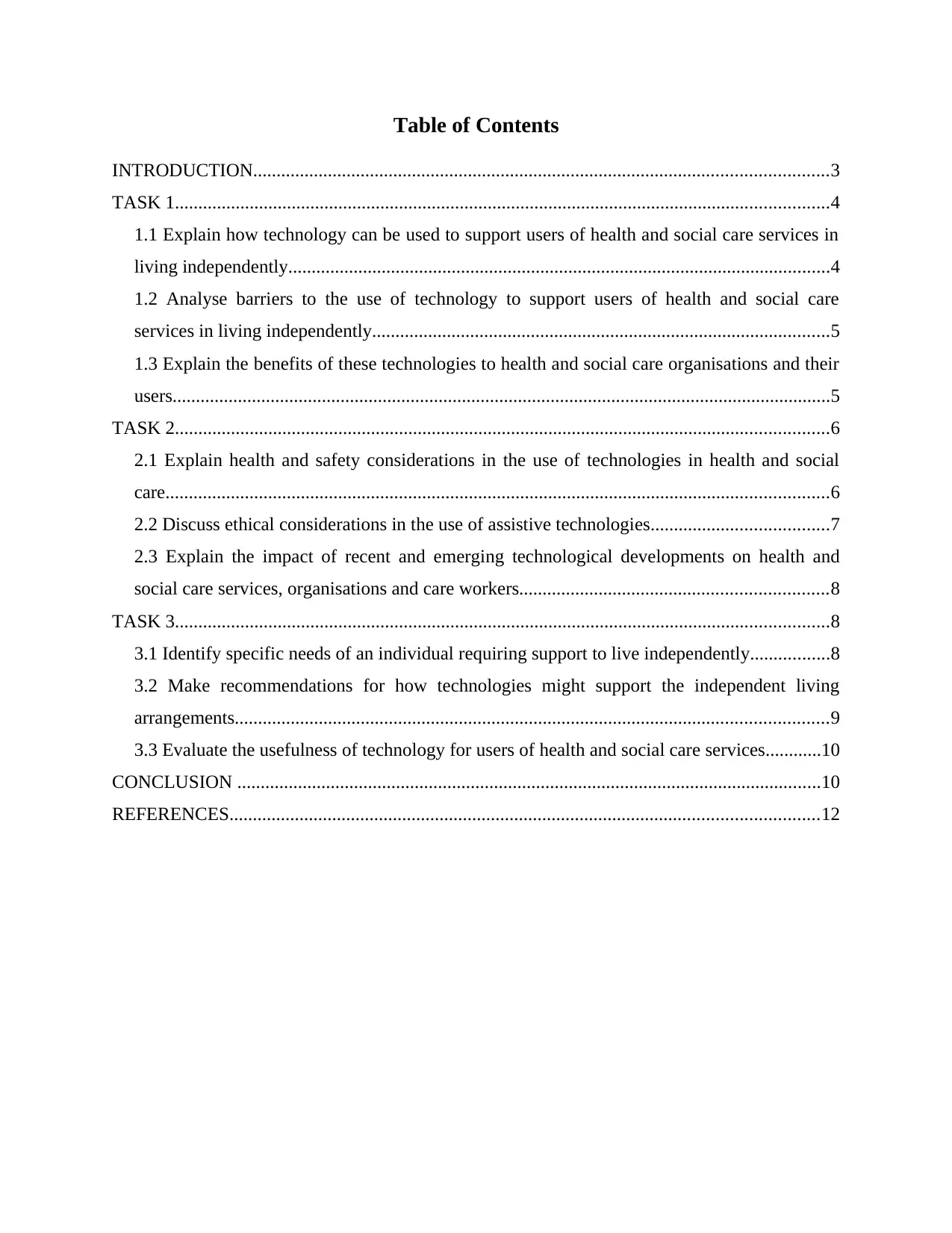
Table of Contents
INTRODUCTION...........................................................................................................................3
TASK 1............................................................................................................................................4
1.1 Explain how technology can be used to support users of health and social care services in
living independently....................................................................................................................4
1.2 Analyse barriers to the use of technology to support users of health and social care
services in living independently..................................................................................................5
1.3 Explain the benefits of these technologies to health and social care organisations and their
users.............................................................................................................................................5
TASK 2............................................................................................................................................6
2.1 Explain health and safety considerations in the use of technologies in health and social
care..............................................................................................................................................6
2.2 Discuss ethical considerations in the use of assistive technologies......................................7
2.3 Explain the impact of recent and emerging technological developments on health and
social care services, organisations and care workers..................................................................8
TASK 3............................................................................................................................................8
3.1 Identify specific needs of an individual requiring support to live independently.................8
3.2 Make recommendations for how technologies might support the independent living
arrangements...............................................................................................................................9
3.3 Evaluate the usefulness of technology for users of health and social care services............10
CONCLUSION .............................................................................................................................10
REFERENCES..............................................................................................................................12
INTRODUCTION...........................................................................................................................3
TASK 1............................................................................................................................................4
1.1 Explain how technology can be used to support users of health and social care services in
living independently....................................................................................................................4
1.2 Analyse barriers to the use of technology to support users of health and social care
services in living independently..................................................................................................5
1.3 Explain the benefits of these technologies to health and social care organisations and their
users.............................................................................................................................................5
TASK 2............................................................................................................................................6
2.1 Explain health and safety considerations in the use of technologies in health and social
care..............................................................................................................................................6
2.2 Discuss ethical considerations in the use of assistive technologies......................................7
2.3 Explain the impact of recent and emerging technological developments on health and
social care services, organisations and care workers..................................................................8
TASK 3............................................................................................................................................8
3.1 Identify specific needs of an individual requiring support to live independently.................8
3.2 Make recommendations for how technologies might support the independent living
arrangements...............................................................................................................................9
3.3 Evaluate the usefulness of technology for users of health and social care services............10
CONCLUSION .............................................................................................................................10
REFERENCES..............................................................................................................................12

INTRODUCTION
Independent living is defined as the policy of giving freedom to the disabled individuals.
It emphasizes on rendering control to disabled people over their freedom and choices. In health
and social care system, technology plays very crucial role in changing the way services are
deliver to users (Angell and et. al, 2019). It not only enable care organisations to attain efficiency
and effectiveness in management work, but it also enables individuals with disability to live live
with more freedom and with their own choices. This report is based on case studies of two
disabled people, Sally and James. The first part of project covers understanding about use of
technology to assist independent living and implications of technological developments in health
and social care. The second part covers technologies evaluation and recommendations to support
independent living for disabled people of health and social care services.
TASK 1
1.1 Explain how technology can be used to support users of health and social care services in
living independently
Over the last few decades, there are many changes takes place in technology which
completely transforms the way services are provided to people in health and social care setting.
These advancements in technology can benefits individuals with disabilities and support them in
living independent life. In health and social care sector, assistive technology is used to ensure
that people with disability can live their lives independently or with freedom. This refers to the
system or devices that are designed to enable and support older and disabled people to sustain
their living self sufficiently.
In the given case, Sally has utilized the gadget called personal digital assistant that aid in
her memory skills. As she is suffering from various diseases, assistive technology is used which
can be helpful in curing the disease. Sally was also provided with social support for personal life,
finance and work decisions and was continuously being treated by professionals and also
provided with PDA which assists her in improving memory status (Franzosa, Tsui and Baron,
2018). The device called “Pocket Coach” enabled her to recognize what to do next by a single
click. Thus, in this manner, health and social care organisations use technology to support people
in living independent life. The use of internet can help to cure disease as there are various online
channels on which therapies are provided by therapist. Also, the advices related to counselling
Independent living is defined as the policy of giving freedom to the disabled individuals.
It emphasizes on rendering control to disabled people over their freedom and choices. In health
and social care system, technology plays very crucial role in changing the way services are
deliver to users (Angell and et. al, 2019). It not only enable care organisations to attain efficiency
and effectiveness in management work, but it also enables individuals with disability to live live
with more freedom and with their own choices. This report is based on case studies of two
disabled people, Sally and James. The first part of project covers understanding about use of
technology to assist independent living and implications of technological developments in health
and social care. The second part covers technologies evaluation and recommendations to support
independent living for disabled people of health and social care services.
TASK 1
1.1 Explain how technology can be used to support users of health and social care services in
living independently
Over the last few decades, there are many changes takes place in technology which
completely transforms the way services are provided to people in health and social care setting.
These advancements in technology can benefits individuals with disabilities and support them in
living independent life. In health and social care sector, assistive technology is used to ensure
that people with disability can live their lives independently or with freedom. This refers to the
system or devices that are designed to enable and support older and disabled people to sustain
their living self sufficiently.
In the given case, Sally has utilized the gadget called personal digital assistant that aid in
her memory skills. As she is suffering from various diseases, assistive technology is used which
can be helpful in curing the disease. Sally was also provided with social support for personal life,
finance and work decisions and was continuously being treated by professionals and also
provided with PDA which assists her in improving memory status (Franzosa, Tsui and Baron,
2018). The device called “Pocket Coach” enabled her to recognize what to do next by a single
click. Thus, in this manner, health and social care organisations use technology to support people
in living independent life. The use of internet can help to cure disease as there are various online
channels on which therapies are provided by therapist. Also, the advices related to counselling
⊘ This is a preview!⊘
Do you want full access?
Subscribe today to unlock all pages.

Trusted by 1+ million students worldwide
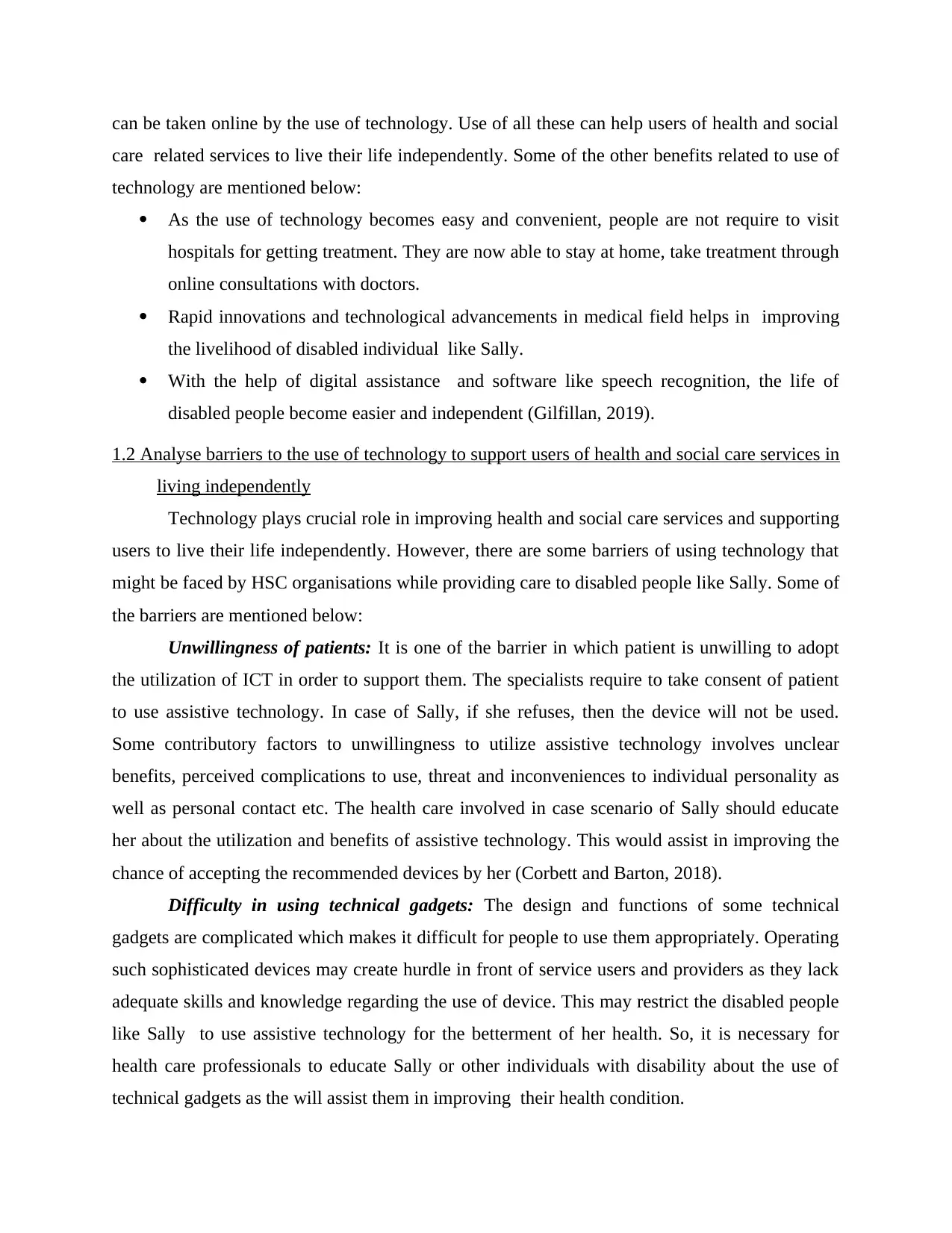
can be taken online by the use of technology. Use of all these can help users of health and social
care related services to live their life independently. Some of the other benefits related to use of
technology are mentioned below:
As the use of technology becomes easy and convenient, people are not require to visit
hospitals for getting treatment. They are now able to stay at home, take treatment through
online consultations with doctors.
Rapid innovations and technological advancements in medical field helps in improving
the livelihood of disabled individual like Sally.
With the help of digital assistance and software like speech recognition, the life of
disabled people become easier and independent (Gilfillan, 2019).
1.2 Analyse barriers to the use of technology to support users of health and social care services in
living independently
Technology plays crucial role in improving health and social care services and supporting
users to live their life independently. However, there are some barriers of using technology that
might be faced by HSC organisations while providing care to disabled people like Sally. Some of
the barriers are mentioned below:
Unwillingness of patients: It is one of the barrier in which patient is unwilling to adopt
the utilization of ICT in order to support them. The specialists require to take consent of patient
to use assistive technology. In case of Sally, if she refuses, then the device will not be used.
Some contributory factors to unwillingness to utilize assistive technology involves unclear
benefits, perceived complications to use, threat and inconveniences to individual personality as
well as personal contact etc. The health care involved in case scenario of Sally should educate
her about the utilization and benefits of assistive technology. This would assist in improving the
chance of accepting the recommended devices by her (Corbett and Barton, 2018).
Difficulty in using technical gadgets: The design and functions of some technical
gadgets are complicated which makes it difficult for people to use them appropriately. Operating
such sophisticated devices may create hurdle in front of service users and providers as they lack
adequate skills and knowledge regarding the use of device. This may restrict the disabled people
like Sally to use assistive technology for the betterment of her health. So, it is necessary for
health care professionals to educate Sally or other individuals with disability about the use of
technical gadgets as the will assist them in improving their health condition.
care related services to live their life independently. Some of the other benefits related to use of
technology are mentioned below:
As the use of technology becomes easy and convenient, people are not require to visit
hospitals for getting treatment. They are now able to stay at home, take treatment through
online consultations with doctors.
Rapid innovations and technological advancements in medical field helps in improving
the livelihood of disabled individual like Sally.
With the help of digital assistance and software like speech recognition, the life of
disabled people become easier and independent (Gilfillan, 2019).
1.2 Analyse barriers to the use of technology to support users of health and social care services in
living independently
Technology plays crucial role in improving health and social care services and supporting
users to live their life independently. However, there are some barriers of using technology that
might be faced by HSC organisations while providing care to disabled people like Sally. Some of
the barriers are mentioned below:
Unwillingness of patients: It is one of the barrier in which patient is unwilling to adopt
the utilization of ICT in order to support them. The specialists require to take consent of patient
to use assistive technology. In case of Sally, if she refuses, then the device will not be used.
Some contributory factors to unwillingness to utilize assistive technology involves unclear
benefits, perceived complications to use, threat and inconveniences to individual personality as
well as personal contact etc. The health care involved in case scenario of Sally should educate
her about the utilization and benefits of assistive technology. This would assist in improving the
chance of accepting the recommended devices by her (Corbett and Barton, 2018).
Difficulty in using technical gadgets: The design and functions of some technical
gadgets are complicated which makes it difficult for people to use them appropriately. Operating
such sophisticated devices may create hurdle in front of service users and providers as they lack
adequate skills and knowledge regarding the use of device. This may restrict the disabled people
like Sally to use assistive technology for the betterment of her health. So, it is necessary for
health care professionals to educate Sally or other individuals with disability about the use of
technical gadgets as the will assist them in improving their health condition.
Paraphrase This Document
Need a fresh take? Get an instant paraphrase of this document with our AI Paraphraser
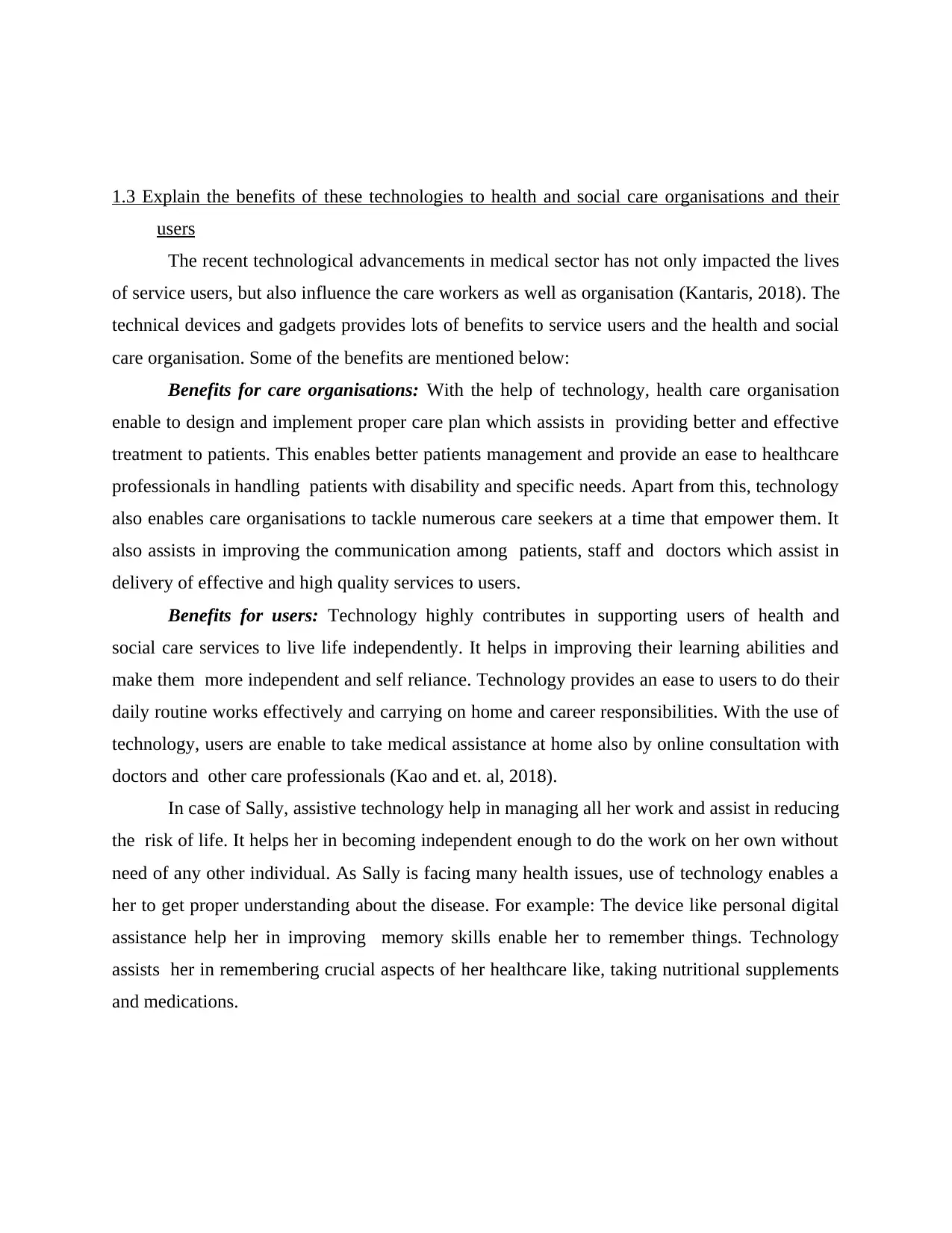
1.3 Explain the benefits of these technologies to health and social care organisations and their
users
The recent technological advancements in medical sector has not only impacted the lives
of service users, but also influence the care workers as well as organisation (Kantaris, 2018). The
technical devices and gadgets provides lots of benefits to service users and the health and social
care organisation. Some of the benefits are mentioned below:
Benefits for care organisations: With the help of technology, health care organisation
enable to design and implement proper care plan which assists in providing better and effective
treatment to patients. This enables better patients management and provide an ease to healthcare
professionals in handling patients with disability and specific needs. Apart from this, technology
also enables care organisations to tackle numerous care seekers at a time that empower them. It
also assists in improving the communication among patients, staff and doctors which assist in
delivery of effective and high quality services to users.
Benefits for users: Technology highly contributes in supporting users of health and
social care services to live life independently. It helps in improving their learning abilities and
make them more independent and self reliance. Technology provides an ease to users to do their
daily routine works effectively and carrying on home and career responsibilities. With the use of
technology, users are enable to take medical assistance at home also by online consultation with
doctors and other care professionals (Kao and et. al, 2018).
In case of Sally, assistive technology help in managing all her work and assist in reducing
the risk of life. It helps her in becoming independent enough to do the work on her own without
need of any other individual. As Sally is facing many health issues, use of technology enables a
her to get proper understanding about the disease. For example: The device like personal digital
assistance help her in improving memory skills enable her to remember things. Technology
assists her in remembering crucial aspects of her healthcare like, taking nutritional supplements
and medications.
users
The recent technological advancements in medical sector has not only impacted the lives
of service users, but also influence the care workers as well as organisation (Kantaris, 2018). The
technical devices and gadgets provides lots of benefits to service users and the health and social
care organisation. Some of the benefits are mentioned below:
Benefits for care organisations: With the help of technology, health care organisation
enable to design and implement proper care plan which assists in providing better and effective
treatment to patients. This enables better patients management and provide an ease to healthcare
professionals in handling patients with disability and specific needs. Apart from this, technology
also enables care organisations to tackle numerous care seekers at a time that empower them. It
also assists in improving the communication among patients, staff and doctors which assist in
delivery of effective and high quality services to users.
Benefits for users: Technology highly contributes in supporting users of health and
social care services to live life independently. It helps in improving their learning abilities and
make them more independent and self reliance. Technology provides an ease to users to do their
daily routine works effectively and carrying on home and career responsibilities. With the use of
technology, users are enable to take medical assistance at home also by online consultation with
doctors and other care professionals (Kao and et. al, 2018).
In case of Sally, assistive technology help in managing all her work and assist in reducing
the risk of life. It helps her in becoming independent enough to do the work on her own without
need of any other individual. As Sally is facing many health issues, use of technology enables a
her to get proper understanding about the disease. For example: The device like personal digital
assistance help her in improving memory skills enable her to remember things. Technology
assists her in remembering crucial aspects of her healthcare like, taking nutritional supplements
and medications.
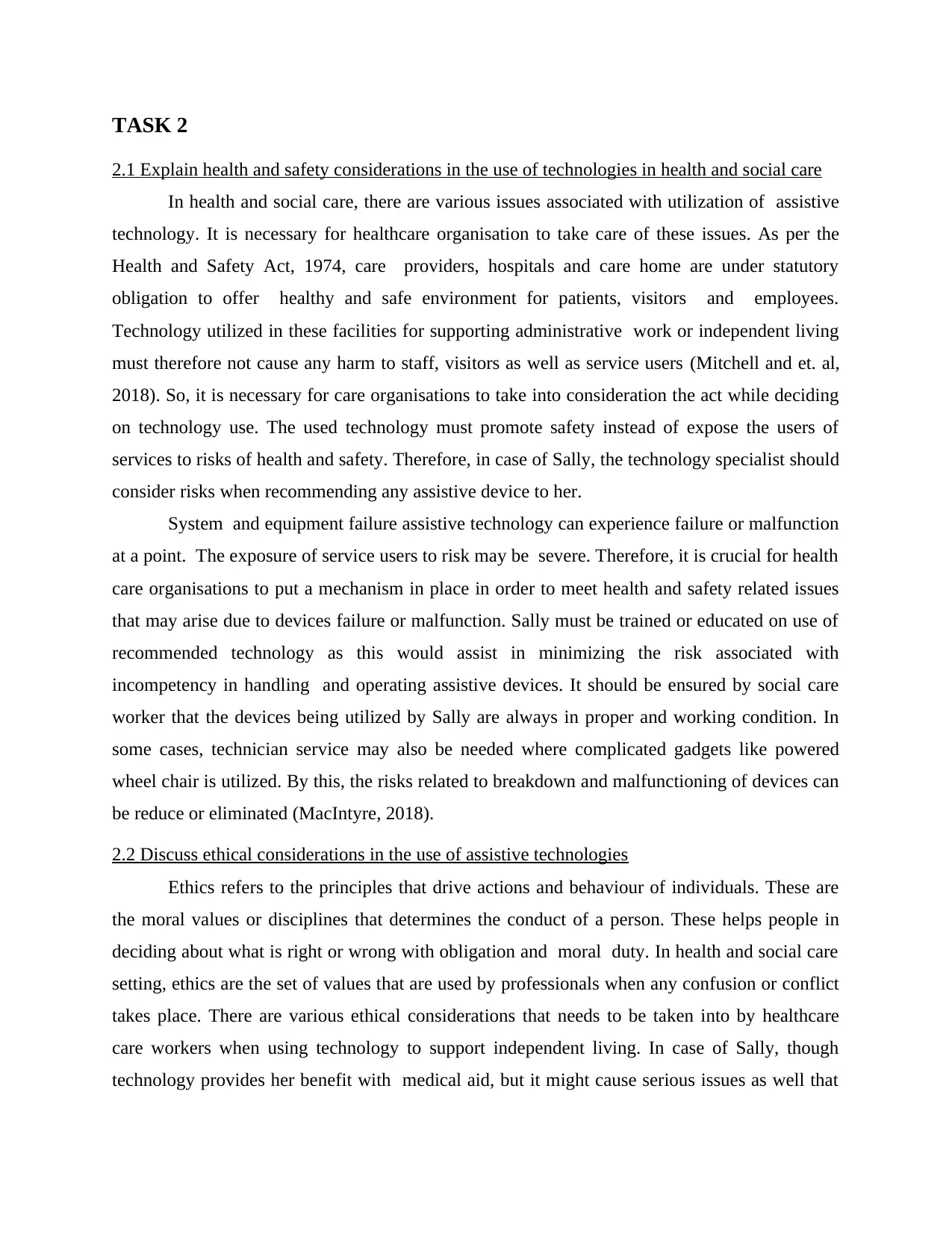
TASK 2
2.1 Explain health and safety considerations in the use of technologies in health and social care
In health and social care, there are various issues associated with utilization of assistive
technology. It is necessary for healthcare organisation to take care of these issues. As per the
Health and Safety Act, 1974, care providers, hospitals and care home are under statutory
obligation to offer healthy and safe environment for patients, visitors and employees.
Technology utilized in these facilities for supporting administrative work or independent living
must therefore not cause any harm to staff, visitors as well as service users (Mitchell and et. al,
2018). So, it is necessary for care organisations to take into consideration the act while deciding
on technology use. The used technology must promote safety instead of expose the users of
services to risks of health and safety. Therefore, in case of Sally, the technology specialist should
consider risks when recommending any assistive device to her.
System and equipment failure assistive technology can experience failure or malfunction
at a point. The exposure of service users to risk may be severe. Therefore, it is crucial for health
care organisations to put a mechanism in place in order to meet health and safety related issues
that may arise due to devices failure or malfunction. Sally must be trained or educated on use of
recommended technology as this would assist in minimizing the risk associated with
incompetency in handling and operating assistive devices. It should be ensured by social care
worker that the devices being utilized by Sally are always in proper and working condition. In
some cases, technician service may also be needed where complicated gadgets like powered
wheel chair is utilized. By this, the risks related to breakdown and malfunctioning of devices can
be reduce or eliminated (MacIntyre, 2018).
2.2 Discuss ethical considerations in the use of assistive technologies
Ethics refers to the principles that drive actions and behaviour of individuals. These are
the moral values or disciplines that determines the conduct of a person. These helps people in
deciding about what is right or wrong with obligation and moral duty. In health and social care
setting, ethics are the set of values that are used by professionals when any confusion or conflict
takes place. There are various ethical considerations that needs to be taken into by healthcare
care workers when using technology to support independent living. In case of Sally, though
technology provides her benefit with medical aid, but it might cause serious issues as well that
2.1 Explain health and safety considerations in the use of technologies in health and social care
In health and social care, there are various issues associated with utilization of assistive
technology. It is necessary for healthcare organisation to take care of these issues. As per the
Health and Safety Act, 1974, care providers, hospitals and care home are under statutory
obligation to offer healthy and safe environment for patients, visitors and employees.
Technology utilized in these facilities for supporting administrative work or independent living
must therefore not cause any harm to staff, visitors as well as service users (Mitchell and et. al,
2018). So, it is necessary for care organisations to take into consideration the act while deciding
on technology use. The used technology must promote safety instead of expose the users of
services to risks of health and safety. Therefore, in case of Sally, the technology specialist should
consider risks when recommending any assistive device to her.
System and equipment failure assistive technology can experience failure or malfunction
at a point. The exposure of service users to risk may be severe. Therefore, it is crucial for health
care organisations to put a mechanism in place in order to meet health and safety related issues
that may arise due to devices failure or malfunction. Sally must be trained or educated on use of
recommended technology as this would assist in minimizing the risk associated with
incompetency in handling and operating assistive devices. It should be ensured by social care
worker that the devices being utilized by Sally are always in proper and working condition. In
some cases, technician service may also be needed where complicated gadgets like powered
wheel chair is utilized. By this, the risks related to breakdown and malfunctioning of devices can
be reduce or eliminated (MacIntyre, 2018).
2.2 Discuss ethical considerations in the use of assistive technologies
Ethics refers to the principles that drive actions and behaviour of individuals. These are
the moral values or disciplines that determines the conduct of a person. These helps people in
deciding about what is right or wrong with obligation and moral duty. In health and social care
setting, ethics are the set of values that are used by professionals when any confusion or conflict
takes place. There are various ethical considerations that needs to be taken into by healthcare
care workers when using technology to support independent living. In case of Sally, though
technology provides her benefit with medical aid, but it might cause serious issues as well that
⊘ This is a preview!⊘
Do you want full access?
Subscribe today to unlock all pages.

Trusted by 1+ million students worldwide
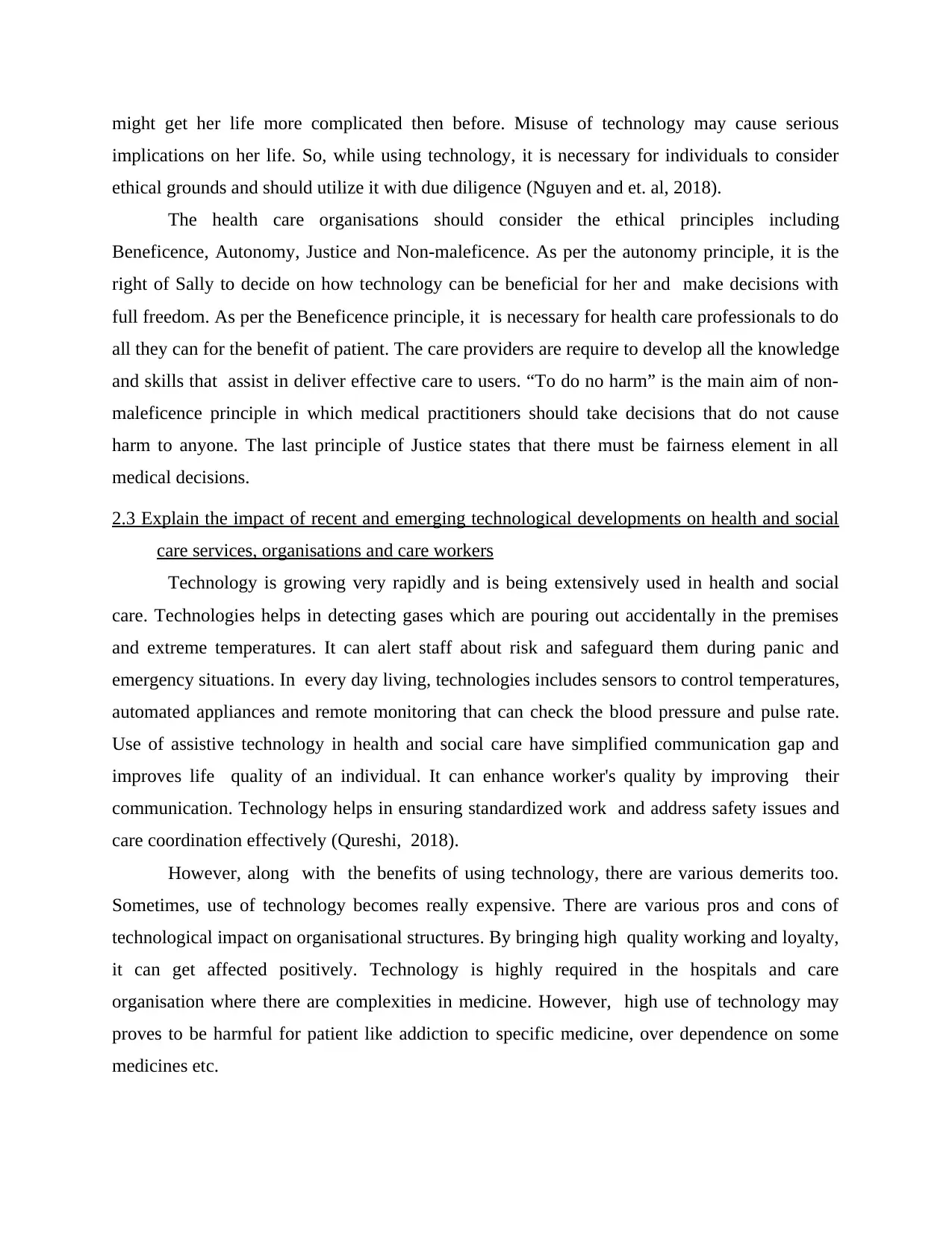
might get her life more complicated then before. Misuse of technology may cause serious
implications on her life. So, while using technology, it is necessary for individuals to consider
ethical grounds and should utilize it with due diligence (Nguyen and et. al, 2018).
The health care organisations should consider the ethical principles including
Beneficence, Autonomy, Justice and Non-maleficence. As per the autonomy principle, it is the
right of Sally to decide on how technology can be beneficial for her and make decisions with
full freedom. As per the Beneficence principle, it is necessary for health care professionals to do
all they can for the benefit of patient. The care providers are require to develop all the knowledge
and skills that assist in deliver effective care to users. “To do no harm” is the main aim of non-
maleficence principle in which medical practitioners should take decisions that do not cause
harm to anyone. The last principle of Justice states that there must be fairness element in all
medical decisions.
2.3 Explain the impact of recent and emerging technological developments on health and social
care services, organisations and care workers
Technology is growing very rapidly and is being extensively used in health and social
care. Technologies helps in detecting gases which are pouring out accidentally in the premises
and extreme temperatures. It can alert staff about risk and safeguard them during panic and
emergency situations. In every day living, technologies includes sensors to control temperatures,
automated appliances and remote monitoring that can check the blood pressure and pulse rate.
Use of assistive technology in health and social care have simplified communication gap and
improves life quality of an individual. It can enhance worker's quality by improving their
communication. Technology helps in ensuring standardized work and address safety issues and
care coordination effectively (Qureshi, 2018).
However, along with the benefits of using technology, there are various demerits too.
Sometimes, use of technology becomes really expensive. There are various pros and cons of
technological impact on organisational structures. By bringing high quality working and loyalty,
it can get affected positively. Technology is highly required in the hospitals and care
organisation where there are complexities in medicine. However, high use of technology may
proves to be harmful for patient like addiction to specific medicine, over dependence on some
medicines etc.
implications on her life. So, while using technology, it is necessary for individuals to consider
ethical grounds and should utilize it with due diligence (Nguyen and et. al, 2018).
The health care organisations should consider the ethical principles including
Beneficence, Autonomy, Justice and Non-maleficence. As per the autonomy principle, it is the
right of Sally to decide on how technology can be beneficial for her and make decisions with
full freedom. As per the Beneficence principle, it is necessary for health care professionals to do
all they can for the benefit of patient. The care providers are require to develop all the knowledge
and skills that assist in deliver effective care to users. “To do no harm” is the main aim of non-
maleficence principle in which medical practitioners should take decisions that do not cause
harm to anyone. The last principle of Justice states that there must be fairness element in all
medical decisions.
2.3 Explain the impact of recent and emerging technological developments on health and social
care services, organisations and care workers
Technology is growing very rapidly and is being extensively used in health and social
care. Technologies helps in detecting gases which are pouring out accidentally in the premises
and extreme temperatures. It can alert staff about risk and safeguard them during panic and
emergency situations. In every day living, technologies includes sensors to control temperatures,
automated appliances and remote monitoring that can check the blood pressure and pulse rate.
Use of assistive technology in health and social care have simplified communication gap and
improves life quality of an individual. It can enhance worker's quality by improving their
communication. Technology helps in ensuring standardized work and address safety issues and
care coordination effectively (Qureshi, 2018).
However, along with the benefits of using technology, there are various demerits too.
Sometimes, use of technology becomes really expensive. There are various pros and cons of
technological impact on organisational structures. By bringing high quality working and loyalty,
it can get affected positively. Technology is highly required in the hospitals and care
organisation where there are complexities in medicine. However, high use of technology may
proves to be harmful for patient like addiction to specific medicine, over dependence on some
medicines etc.
Paraphrase This Document
Need a fresh take? Get an instant paraphrase of this document with our AI Paraphraser
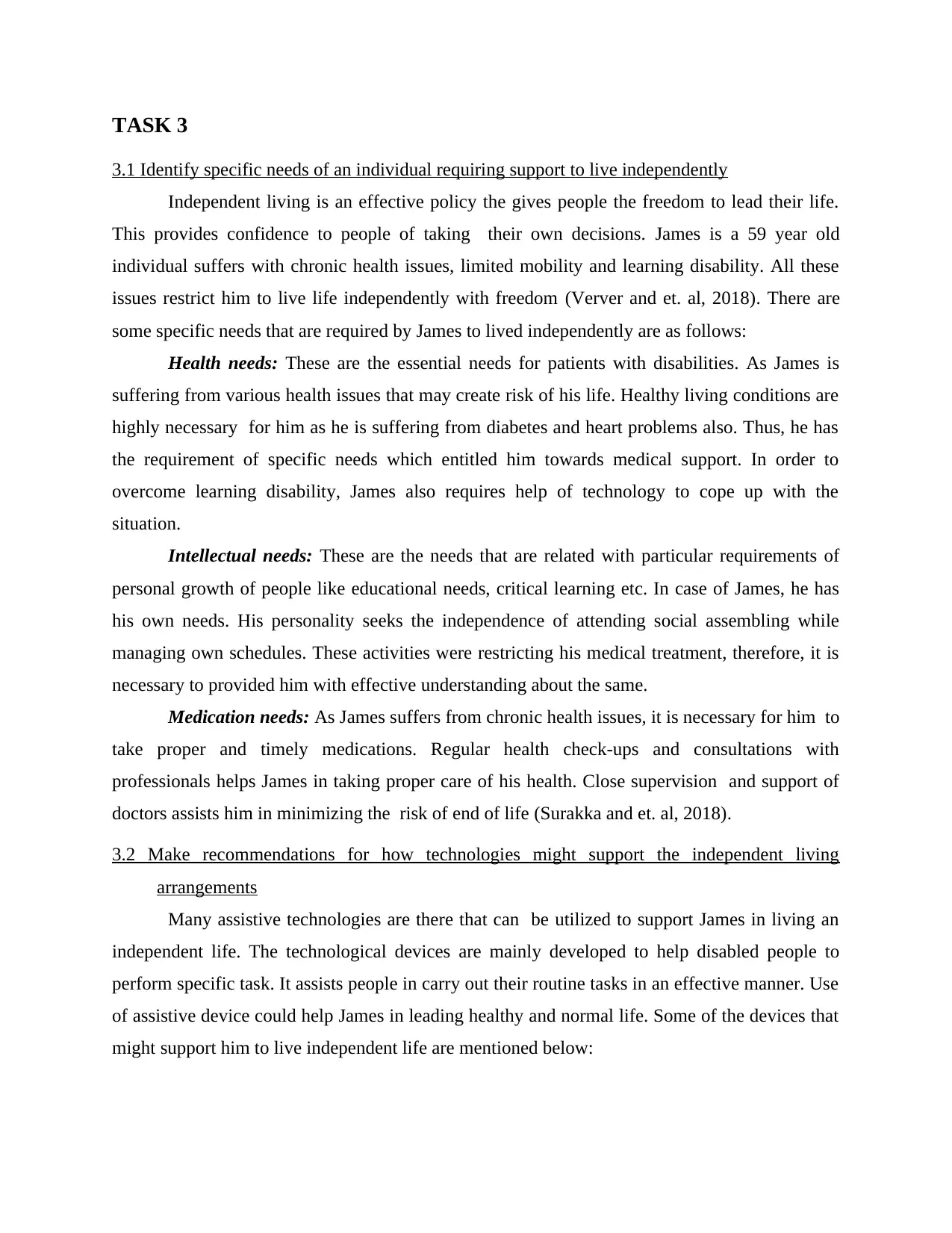
TASK 3
3.1 Identify specific needs of an individual requiring support to live independently
Independent living is an effective policy the gives people the freedom to lead their life.
This provides confidence to people of taking their own decisions. James is a 59 year old
individual suffers with chronic health issues, limited mobility and learning disability. All these
issues restrict him to live life independently with freedom (Verver and et. al, 2018). There are
some specific needs that are required by James to lived independently are as follows:
Health needs: These are the essential needs for patients with disabilities. As James is
suffering from various health issues that may create risk of his life. Healthy living conditions are
highly necessary for him as he is suffering from diabetes and heart problems also. Thus, he has
the requirement of specific needs which entitled him towards medical support. In order to
overcome learning disability, James also requires help of technology to cope up with the
situation.
Intellectual needs: These are the needs that are related with particular requirements of
personal growth of people like educational needs, critical learning etc. In case of James, he has
his own needs. His personality seeks the independence of attending social assembling while
managing own schedules. These activities were restricting his medical treatment, therefore, it is
necessary to provided him with effective understanding about the same.
Medication needs: As James suffers from chronic health issues, it is necessary for him to
take proper and timely medications. Regular health check-ups and consultations with
professionals helps James in taking proper care of his health. Close supervision and support of
doctors assists him in minimizing the risk of end of life (Surakka and et. al, 2018).
3.2 Make recommendations for how technologies might support the independent living
arrangements
Many assistive technologies are there that can be utilized to support James in living an
independent life. The technological devices are mainly developed to help disabled people to
perform specific task. It assists people in carry out their routine tasks in an effective manner. Use
of assistive device could help James in leading healthy and normal life. Some of the devices that
might support him to live independent life are mentioned below:
3.1 Identify specific needs of an individual requiring support to live independently
Independent living is an effective policy the gives people the freedom to lead their life.
This provides confidence to people of taking their own decisions. James is a 59 year old
individual suffers with chronic health issues, limited mobility and learning disability. All these
issues restrict him to live life independently with freedom (Verver and et. al, 2018). There are
some specific needs that are required by James to lived independently are as follows:
Health needs: These are the essential needs for patients with disabilities. As James is
suffering from various health issues that may create risk of his life. Healthy living conditions are
highly necessary for him as he is suffering from diabetes and heart problems also. Thus, he has
the requirement of specific needs which entitled him towards medical support. In order to
overcome learning disability, James also requires help of technology to cope up with the
situation.
Intellectual needs: These are the needs that are related with particular requirements of
personal growth of people like educational needs, critical learning etc. In case of James, he has
his own needs. His personality seeks the independence of attending social assembling while
managing own schedules. These activities were restricting his medical treatment, therefore, it is
necessary to provided him with effective understanding about the same.
Medication needs: As James suffers from chronic health issues, it is necessary for him to
take proper and timely medications. Regular health check-ups and consultations with
professionals helps James in taking proper care of his health. Close supervision and support of
doctors assists him in minimizing the risk of end of life (Surakka and et. al, 2018).
3.2 Make recommendations for how technologies might support the independent living
arrangements
Many assistive technologies are there that can be utilized to support James in living an
independent life. The technological devices are mainly developed to help disabled people to
perform specific task. It assists people in carry out their routine tasks in an effective manner. Use
of assistive device could help James in leading healthy and normal life. Some of the devices that
might support him to live independent life are mentioned below:
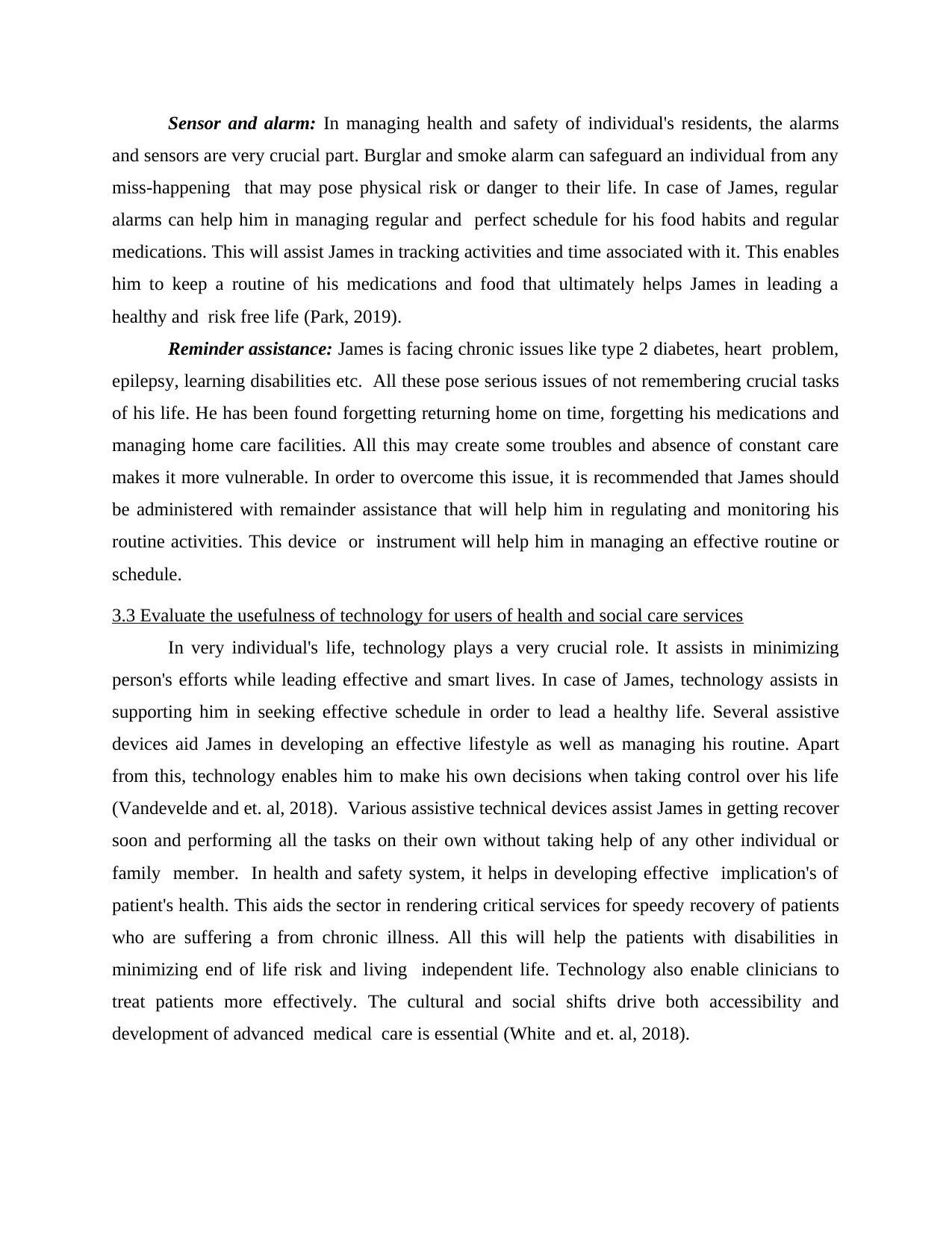
Sensor and alarm: In managing health and safety of individual's residents, the alarms
and sensors are very crucial part. Burglar and smoke alarm can safeguard an individual from any
miss-happening that may pose physical risk or danger to their life. In case of James, regular
alarms can help him in managing regular and perfect schedule for his food habits and regular
medications. This will assist James in tracking activities and time associated with it. This enables
him to keep a routine of his medications and food that ultimately helps James in leading a
healthy and risk free life (Park, 2019).
Reminder assistance: James is facing chronic issues like type 2 diabetes, heart problem,
epilepsy, learning disabilities etc. All these pose serious issues of not remembering crucial tasks
of his life. He has been found forgetting returning home on time, forgetting his medications and
managing home care facilities. All this may create some troubles and absence of constant care
makes it more vulnerable. In order to overcome this issue, it is recommended that James should
be administered with remainder assistance that will help him in regulating and monitoring his
routine activities. This device or instrument will help him in managing an effective routine or
schedule.
3.3 Evaluate the usefulness of technology for users of health and social care services
In very individual's life, technology plays a very crucial role. It assists in minimizing
person's efforts while leading effective and smart lives. In case of James, technology assists in
supporting him in seeking effective schedule in order to lead a healthy life. Several assistive
devices aid James in developing an effective lifestyle as well as managing his routine. Apart
from this, technology enables him to make his own decisions when taking control over his life
(Vandevelde and et. al, 2018). Various assistive technical devices assist James in getting recover
soon and performing all the tasks on their own without taking help of any other individual or
family member. In health and safety system, it helps in developing effective implication's of
patient's health. This aids the sector in rendering critical services for speedy recovery of patients
who are suffering a from chronic illness. All this will help the patients with disabilities in
minimizing end of life risk and living independent life. Technology also enable clinicians to
treat patients more effectively. The cultural and social shifts drive both accessibility and
development of advanced medical care is essential (White and et. al, 2018).
and sensors are very crucial part. Burglar and smoke alarm can safeguard an individual from any
miss-happening that may pose physical risk or danger to their life. In case of James, regular
alarms can help him in managing regular and perfect schedule for his food habits and regular
medications. This will assist James in tracking activities and time associated with it. This enables
him to keep a routine of his medications and food that ultimately helps James in leading a
healthy and risk free life (Park, 2019).
Reminder assistance: James is facing chronic issues like type 2 diabetes, heart problem,
epilepsy, learning disabilities etc. All these pose serious issues of not remembering crucial tasks
of his life. He has been found forgetting returning home on time, forgetting his medications and
managing home care facilities. All this may create some troubles and absence of constant care
makes it more vulnerable. In order to overcome this issue, it is recommended that James should
be administered with remainder assistance that will help him in regulating and monitoring his
routine activities. This device or instrument will help him in managing an effective routine or
schedule.
3.3 Evaluate the usefulness of technology for users of health and social care services
In very individual's life, technology plays a very crucial role. It assists in minimizing
person's efforts while leading effective and smart lives. In case of James, technology assists in
supporting him in seeking effective schedule in order to lead a healthy life. Several assistive
devices aid James in developing an effective lifestyle as well as managing his routine. Apart
from this, technology enables him to make his own decisions when taking control over his life
(Vandevelde and et. al, 2018). Various assistive technical devices assist James in getting recover
soon and performing all the tasks on their own without taking help of any other individual or
family member. In health and safety system, it helps in developing effective implication's of
patient's health. This aids the sector in rendering critical services for speedy recovery of patients
who are suffering a from chronic illness. All this will help the patients with disabilities in
minimizing end of life risk and living independent life. Technology also enable clinicians to
treat patients more effectively. The cultural and social shifts drive both accessibility and
development of advanced medical care is essential (White and et. al, 2018).
⊘ This is a preview!⊘
Do you want full access?
Subscribe today to unlock all pages.

Trusted by 1+ million students worldwide
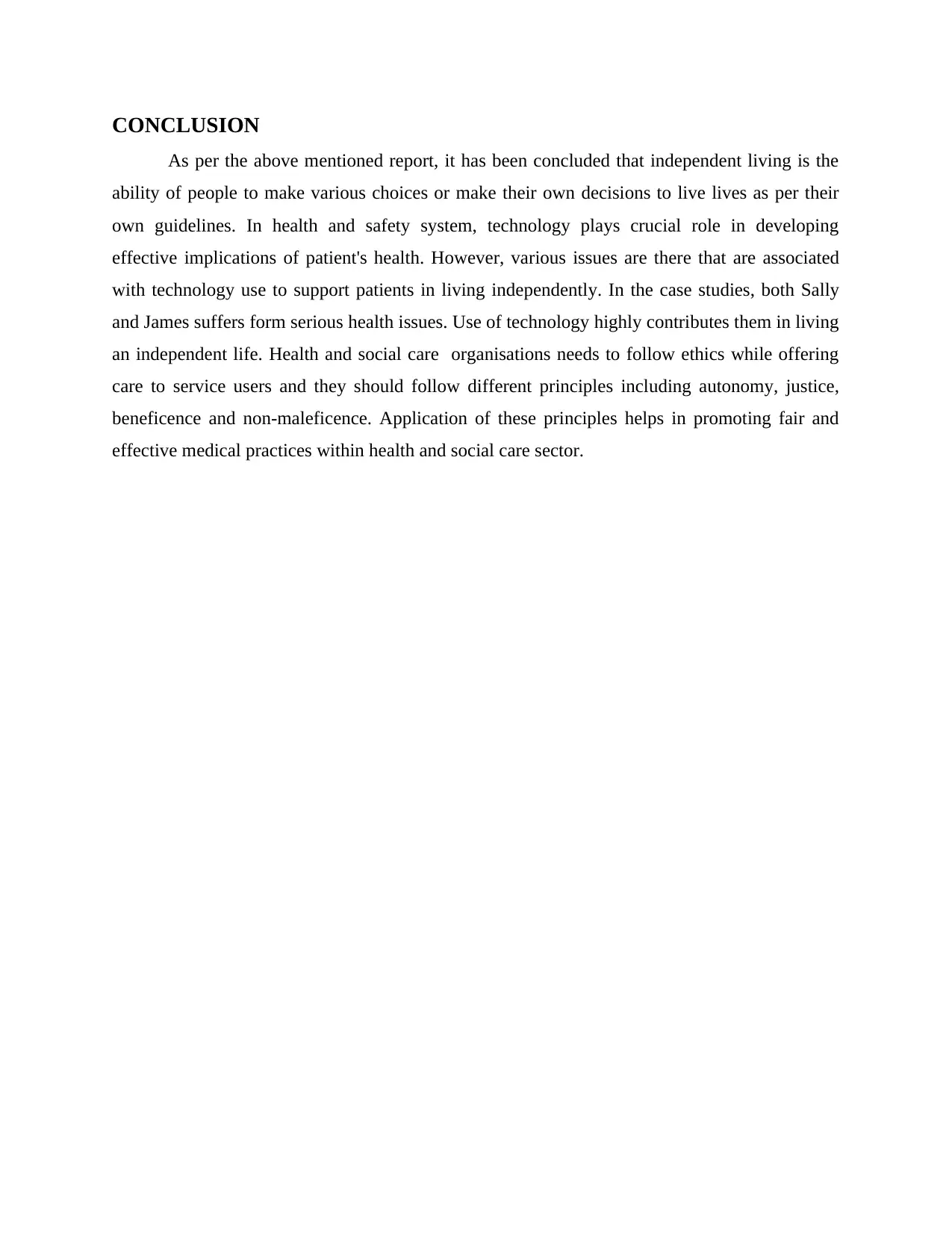
CONCLUSION
As per the above mentioned report, it has been concluded that independent living is the
ability of people to make various choices or make their own decisions to live lives as per their
own guidelines. In health and safety system, technology plays crucial role in developing
effective implications of patient's health. However, various issues are there that are associated
with technology use to support patients in living independently. In the case studies, both Sally
and James suffers form serious health issues. Use of technology highly contributes them in living
an independent life. Health and social care organisations needs to follow ethics while offering
care to service users and they should follow different principles including autonomy, justice,
beneficence and non-maleficence. Application of these principles helps in promoting fair and
effective medical practices within health and social care sector.
As per the above mentioned report, it has been concluded that independent living is the
ability of people to make various choices or make their own decisions to live lives as per their
own guidelines. In health and safety system, technology plays crucial role in developing
effective implications of patient's health. However, various issues are there that are associated
with technology use to support patients in living independently. In the case studies, both Sally
and James suffers form serious health issues. Use of technology highly contributes them in living
an independent life. Health and social care organisations needs to follow ethics while offering
care to service users and they should follow different principles including autonomy, justice,
beneficence and non-maleficence. Application of these principles helps in promoting fair and
effective medical practices within health and social care sector.
Paraphrase This Document
Need a fresh take? Get an instant paraphrase of this document with our AI Paraphraser
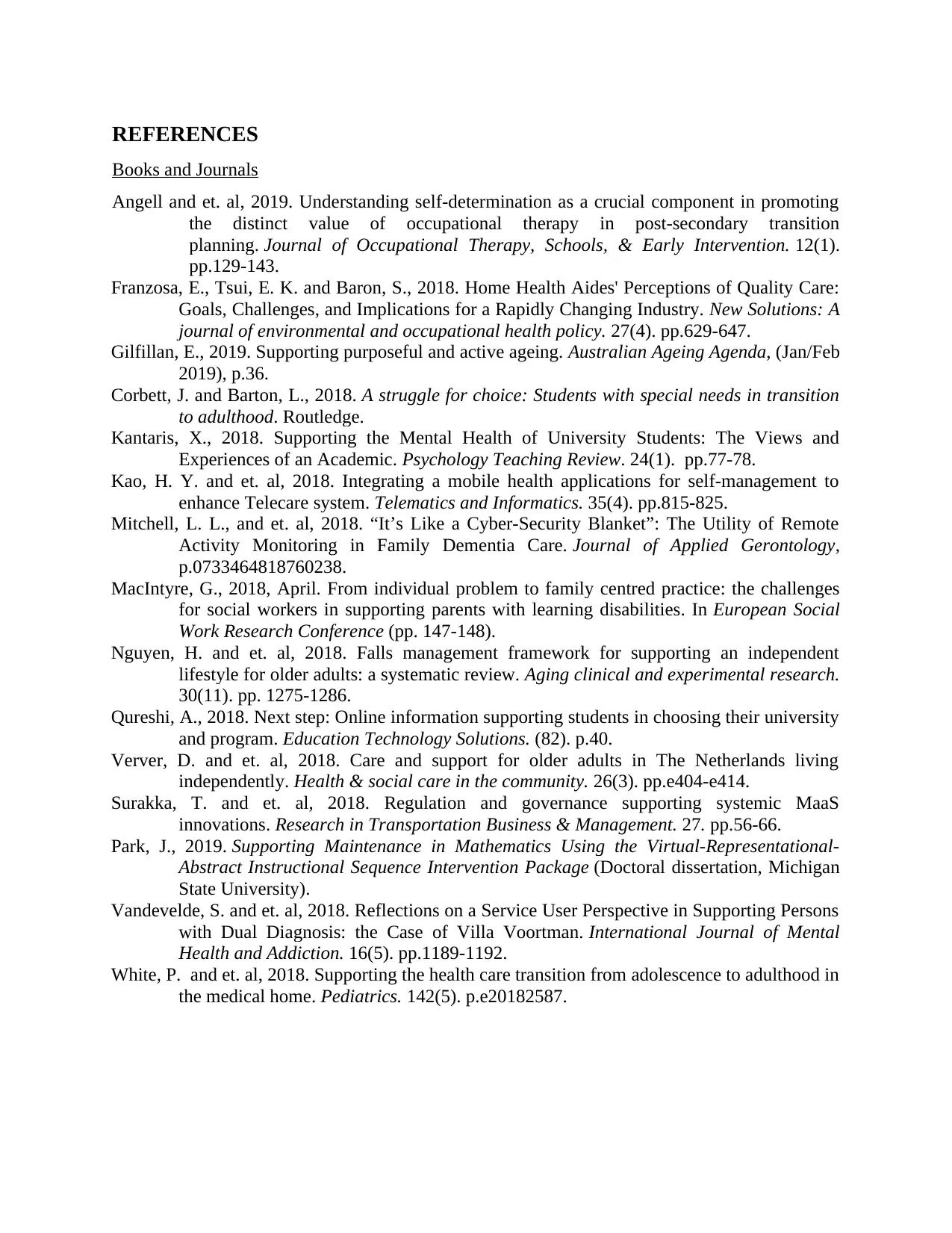
REFERENCES
Books and Journals
Angell and et. al, 2019. Understanding self-determination as a crucial component in promoting
the distinct value of occupational therapy in post-secondary transition
planning. Journal of Occupational Therapy, Schools, & Early Intervention. 12(1).
pp.129-143.
Franzosa, E., Tsui, E. K. and Baron, S., 2018. Home Health Aides' Perceptions of Quality Care:
Goals, Challenges, and Implications for a Rapidly Changing Industry. New Solutions: A
journal of environmental and occupational health policy. 27(4). pp.629-647.
Gilfillan, E., 2019. Supporting purposeful and active ageing. Australian Ageing Agenda, (Jan/Feb
2019), p.36.
Corbett, J. and Barton, L., 2018. A struggle for choice: Students with special needs in transition
to adulthood. Routledge.
Kantaris, X., 2018. Supporting the Mental Health of University Students: The Views and
Experiences of an Academic. Psychology Teaching Review. 24(1). pp.77-78.
Kao, H. Y. and et. al, 2018. Integrating a mobile health applications for self-management to
enhance Telecare system. Telematics and Informatics. 35(4). pp.815-825.
Mitchell, L. L., and et. al, 2018. “It’s Like a Cyber-Security Blanket”: The Utility of Remote
Activity Monitoring in Family Dementia Care. Journal of Applied Gerontology,
p.0733464818760238.
MacIntyre, G., 2018, April. From individual problem to family centred practice: the challenges
for social workers in supporting parents with learning disabilities. In European Social
Work Research Conference (pp. 147-148).
Nguyen, H. and et. al, 2018. Falls management framework for supporting an independent
lifestyle for older adults: a systematic review. Aging clinical and experimental research.
30(11). pp. 1275-1286.
Qureshi, A., 2018. Next step: Online information supporting students in choosing their university
and program. Education Technology Solutions. (82). p.40.
Verver, D. and et. al, 2018. Care and support for older adults in The Netherlands living
independently. Health & social care in the community. 26(3). pp.e404-e414.
Surakka, T. and et. al, 2018. Regulation and governance supporting systemic MaaS
innovations. Research in Transportation Business & Management. 27. pp.56-66.
Park, J., 2019. Supporting Maintenance in Mathematics Using the Virtual-Representational-
Abstract Instructional Sequence Intervention Package (Doctoral dissertation, Michigan
State University).
Vandevelde, S. and et. al, 2018. Reflections on a Service User Perspective in Supporting Persons
with Dual Diagnosis: the Case of Villa Voortman. International Journal of Mental
Health and Addiction. 16(5). pp.1189-1192.
White, P. and et. al, 2018. Supporting the health care transition from adolescence to adulthood in
the medical home. Pediatrics. 142(5). p.e20182587.
Books and Journals
Angell and et. al, 2019. Understanding self-determination as a crucial component in promoting
the distinct value of occupational therapy in post-secondary transition
planning. Journal of Occupational Therapy, Schools, & Early Intervention. 12(1).
pp.129-143.
Franzosa, E., Tsui, E. K. and Baron, S., 2018. Home Health Aides' Perceptions of Quality Care:
Goals, Challenges, and Implications for a Rapidly Changing Industry. New Solutions: A
journal of environmental and occupational health policy. 27(4). pp.629-647.
Gilfillan, E., 2019. Supporting purposeful and active ageing. Australian Ageing Agenda, (Jan/Feb
2019), p.36.
Corbett, J. and Barton, L., 2018. A struggle for choice: Students with special needs in transition
to adulthood. Routledge.
Kantaris, X., 2018. Supporting the Mental Health of University Students: The Views and
Experiences of an Academic. Psychology Teaching Review. 24(1). pp.77-78.
Kao, H. Y. and et. al, 2018. Integrating a mobile health applications for self-management to
enhance Telecare system. Telematics and Informatics. 35(4). pp.815-825.
Mitchell, L. L., and et. al, 2018. “It’s Like a Cyber-Security Blanket”: The Utility of Remote
Activity Monitoring in Family Dementia Care. Journal of Applied Gerontology,
p.0733464818760238.
MacIntyre, G., 2018, April. From individual problem to family centred practice: the challenges
for social workers in supporting parents with learning disabilities. In European Social
Work Research Conference (pp. 147-148).
Nguyen, H. and et. al, 2018. Falls management framework for supporting an independent
lifestyle for older adults: a systematic review. Aging clinical and experimental research.
30(11). pp. 1275-1286.
Qureshi, A., 2018. Next step: Online information supporting students in choosing their university
and program. Education Technology Solutions. (82). p.40.
Verver, D. and et. al, 2018. Care and support for older adults in The Netherlands living
independently. Health & social care in the community. 26(3). pp.e404-e414.
Surakka, T. and et. al, 2018. Regulation and governance supporting systemic MaaS
innovations. Research in Transportation Business & Management. 27. pp.56-66.
Park, J., 2019. Supporting Maintenance in Mathematics Using the Virtual-Representational-
Abstract Instructional Sequence Intervention Package (Doctoral dissertation, Michigan
State University).
Vandevelde, S. and et. al, 2018. Reflections on a Service User Perspective in Supporting Persons
with Dual Diagnosis: the Case of Villa Voortman. International Journal of Mental
Health and Addiction. 16(5). pp.1189-1192.
White, P. and et. al, 2018. Supporting the health care transition from adolescence to adulthood in
the medical home. Pediatrics. 142(5). p.e20182587.
1 out of 11
Related Documents
Your All-in-One AI-Powered Toolkit for Academic Success.
+13062052269
info@desklib.com
Available 24*7 on WhatsApp / Email
![[object Object]](/_next/static/media/star-bottom.7253800d.svg)
Unlock your academic potential
Copyright © 2020–2026 A2Z Services. All Rights Reserved. Developed and managed by ZUCOL.





